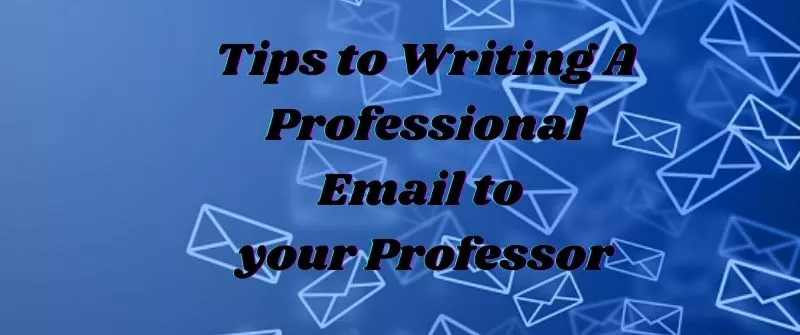How to Email a Professor: Etiquettes for Help, Research or Grades

When you are emailing your professor, ensure that every email you write should have a professional tone. That is because a professor can have an impact on your academic career. Furthermore, this professor holds important information that you require to take the right direction in your career.
When you are contacting your professor, ensure that you have a positive impression of them. If unsure, you can use the available tools to assist you in gaining confidence and editing any mistakes.
How to Email a Professor
Any email to a professor should be precise to the point. Such an email is different from any casual email you could send to any friend or family member.
If sending an email can be stressful, you should use the following tips to make it appropriate and get a suitable response.
When sending an email or letter to your professor, be sure to use formal salutations, actual names, and titles, and write formally. To make your message clear and understandable, be sure to explain the context of your message and be clear on your request. Finally, remember to keep it short and sign off with your real names.

1. Salutations
Salutations are fundamental to the professional delivery of your email. You can begin with “Hello” or “Dear.”
Avoid using “Hey,” which may sound too casual. Also, using “Hi” makes it look too informal.
2. Name and Title
After salutations, you should follow it by the professor’s title and the name. It is vital to address your professor by the correct name.
That is a way of showing respect to your professor. If you skip that bit, it could be a way of offending your instructor. Remember to capitalize the word professor where necessary, especially when writing his or her name.
You should address most of your instructors as “Doctor” or “Professor” then follow it with their last name. Before you hit the send button, it is critical to double-check the spelling of the name.
3. Provide Context
You should tell the professor who you are because they handle hundreds of similar emails from different students. While the professor may be familiar with your face, matching it with your name may be tricky. You can start your email by identifying who you are and the type of class you are taking.
When you give the details of the class you attend, it becomes easier for the professor to recognize you. If you are sure that the professor knows you, then you can mot this part.
4. Explain your needs
You should state your needs in clear terms. Failure to do so may cause the recipient to give you the wrong response. For example, if the instruction is not explicit over the particular assignment, you should express yourself well until the professor understands what you need.
5. Keep it Short
Put your email on point since the professor receives multiple emails that require a response. When facts are clear in your email, the instructor will not struggle to figure out what you want to say before responding.
6. Sign off
You should now close your email politely. End it with a sign-off and add your name. The best example is “Thanks,” “Cheers,” or “Best.”
Suppose the institution’s email lacks your names, then include them at the end of the email. Such makes an instructor find you in the system.
You can get more guidance on how to do this. You can read our guide on how to sign off an email to your professor to be able to get the idea of ending a formal letter well when it is directed to a faculty.
7. Proofreading
Proofreading is necessary when you write your email to ensure you captured every item correctly. You can edit it if you discover that you mentioned something twice or omitted it unintentionally. Proofreading eliminates any humiliation or embarrassment in the future.
People Also Read: Professor not Grading Assignments on time? Here’s what to do
Instances When You Need to Email Your Professor

When it comes to communication with the student, every professor has a different schedule.
For that reason, some matters will end well when you use an email.
You can email your professor under the following instances:
- Seeking clarification of exam dates and assignments deadlines.
- Scheduling a meeting or arranging for a visit during office hours.
- Clarification over some instruction given in the assignment or to know the requirements of a particular task.
- Responding to the email that the professor already sent to you that required your reaction.
- When discussing a grade.
Do’s and Don’ts of Emailing Your Professor
Dos

1. Use University Email Address
For better identity, you should use the university email. Use your other email account on your family and other friends.
Unsung the email from the university will signal to the professor that you are part of the university community.
2. Remain Formal
When writing an email to your professor, remember it is not the same as sending a mere text. You should use professional language that is devoid of slang, abbreviations, or emoji.
Remain polite since professors are human too, and they can react to negative and positive emotions. You should write naturally. However, avoid sounding robotic.
3. Communicate Early Enough
You should communicate concisely and early enough.
Suppose it is hard to express yourself in writing, then you can request a face-to-face discussion and have a fruitful discussion with the instructor.
4. Follow Up
Professors are busy people who handle the bulk of emails every time. In the process, they may need forger to respond to your email as expected. You have the task of making a follow-up to ensure that you get the feedback within the right time.
5. Appreciation
You should remember to thank your professor for his attention. Make a brief sentence to make the right impression. When you retain a courteous tone in the email, you will likely get a proper response to your desire. Also, courtesy is a great gesture that shows that you have a response to whoever you are addressing.
Don’ts

1) Avoid Using Emotions and smileys
Know that an email to your professor is different from a mere friend. Make it formal and official and keep a professional language always.
Furthermore, you should avoid using all caps (upper case).
2) Never Forget the Subject
Writing an email without a subject is too causal since it creates a bad impression on your professor. For example, the professor might imagine that you are careless or never proofread your work.
Ensure you place a few words that give a clue to your professor concerning what you want to talk about.
People Also Read: Can you Use ‘You’ in Essays or Research Paper: Best Practice
Frequently Asked Questions
How to email a professor about research
Begin with a salutation and begin to express your interest in the research. Offer an appreciation for your topic of research interest. Indicate your experience concerning your research in similar positions.
You can schedule an appointment so that you can drop by and face a face-to-face discussion. You can attach your resume and any unofficial transcript for review. Politely close the letter
How to email a professor about a group member
Tell your professor about your participation in a group and discover that there was a hostile and uncooperative group member. Tell the professor about the careless student who leaves all the work to the group without his presence.
Inform the professor concerning how the group voted you to be the one to make up a write-up and explain the case to the tutor. The intention of the email should be about the lack of contribution by this student.
How to email a professor about passing a class
Begin by recognizing the professor’s input about the ongoing fruitful classes. In the same vein, request the professor to be coming to class without fail so that you do not strain in the future.
Since you all have a tight schedule, let the professor be informing you when a particular class will not be active. Close the email with a polite appreciation for his attention. Read some of the reasons why a professor may not have graded an assignment to get ideas before making an inquiry.
How to write an email to the professor for a project
The salutations are a must in this case. Then do not include soma many details that may make your email confusing. Explain to your professor to offer any advice about the on-going project in which you need some clarity.
Let the professor know that his input is critical towards the success of the same project. For that reason, ask the professor to space sometimes and have a discussion over the same issue.
How to email a professor about a grade
When you have a missing grade in your transcript, it should bother you to email the respective professor about it. Let the instructor know that you never saw the grade, yet you did the exam and associated assignments.
Address the professor with a professional tone for a home to understand your pain points concerning your missing grade. Close the email politely.
Subject line for an email to a professor
The purpose of a subject line is to reflect the content of your email. Also, the subject line will keep the email out of the spam folder. Before you write the subject line, assess the entire content that you want the professor to read.
Avoid a lengthy subject line since it could be boring. Just be precise and hit the point.
How to End an Email to a Professor
You should end the Emil with your professor by signing off politely. Thanks to the professor for being the best professor of your time. You can end with phrases such as “Best regards” or “Best wishes.”
It should be relatively formal and friendly in nature. Sign off with your real name. Avoid using some whacky names that can make your professor not able to identify you correctly.

When not handling complex essays and academic writing tasks, Josh is busy advising students on how to pass assignments. In spare time, he loves playing football or walking with his dog around the park.




